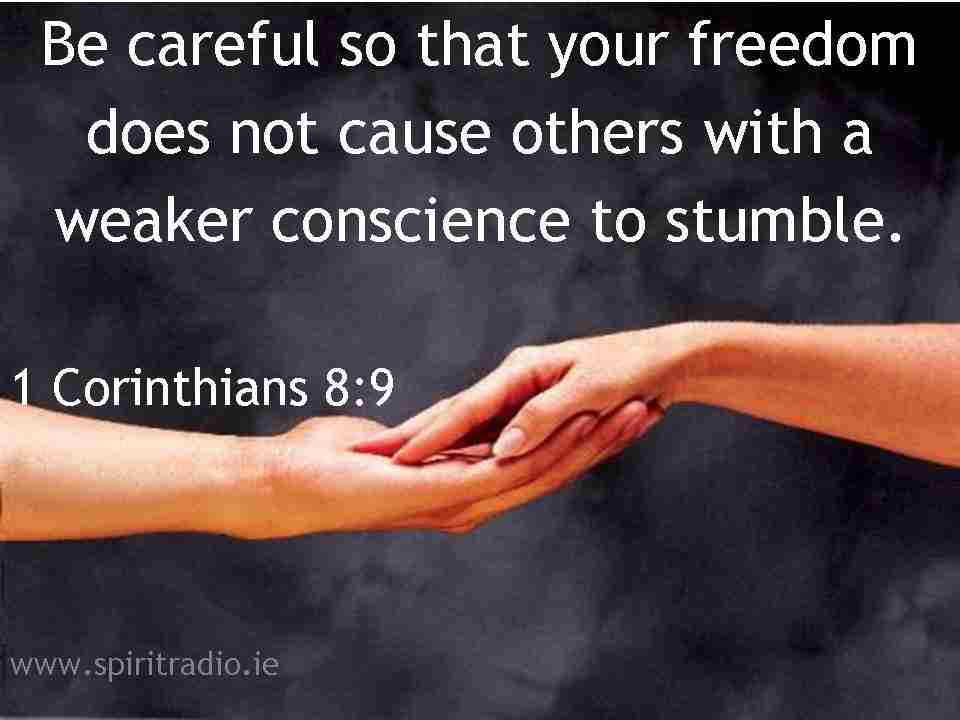Stumbling Block (V) To Eat or Not to Eat?

Around 50-60 A.D., an interesting dilemma developed in the Church of the Corinthians. Throughout the Roman Empire, animal sacrifices were offered to the pagan gods. Following the ritual offering, the remainder of the animal that was not consumed in the ceremony was sold in the public market places. Christians shopping in the market began to question whether it was permissible to eat things sacrificed to idols. In this article, we will see how St. Paul answered this puzzling question, and, from his response, we will learn a general principle that will aid us in avoiding being a stumbling block.
St. Paul begins his argument saying, “We know that an idol is nothing in the world, and that there is no other God but one” (1 Cor. 8:4) and “food does not commend us to God; for neither if we eat are we the better, nor if we do not eat are we the worse” (1 Cor. 8:8). In other words, St. Paul is indicating that there is no difference in the meat butchered secularly or religiously. Therefore, knowledgeable and faithful Christians who are aware of the meaninglessness of idols need not be concerned with the source of their meat.
However, there is a caveat to the preceding argument. St. Paul goes on to say, “[T]here is not in everyone that knowledge; for some eat [meat] offered to an idol; and their conscience, being weak, is defiled” (1 Cor. 8:7), and then he admonishes the “knowledgeable” Christians saying, “[B]eware lest somehow this liberty of yours become a stumbling block to those who are weak…And because of your knowledge shall the weak brother perish, for whom Christ died?” (1 Cor. 8:9, 11). In conclusion, St. Paul says, “Therefore, if food makes my brother stumble, I will never again eat meat, lest I make my brother stumble” (1 Cor. 8:13). Do you see, my dear brethren and sisters, how sensitive St. Paul was for the conscience of the others? The general principle that we must learn from St. Paul is to evaluate our actions not just based upon rules and technicalities, but based upon a spirit of love and the edification of those around us. If even the most simple, routine actions of our life are not done in a spirit of love, we risk being a stumbling block to others. To illustrate this point, I would like to share a few experiences where unconscious actions may be large stumbling blocks.
Say for example, someone comes to our church either for the first time or after not having attended in a while, and no one greets or asks about them. That person might walk out of the church full of resentment thinking that no cares about them. In this scenario, anyone who had the opportunity to greet or ask about them is a stumbling block because on their account, the image of Church was tarnished.
In another example, let us assume that the Church is in a consecrated time of fasting. One person who is fasting attends a gathering of church-goers who are not fasting. Although the non-fasting people may not intend to be stumbling blocks, they are subconsciously sending the message to the fasting person that it is not important to fast. This may also cause the fasting person to resent their fast, wishing to be like the other church-goers.
Although these examples may seem overbearing, as Christians, we must remember that we belong to the one Body of Christ. As one body, we are all connected – any action taken by a member of the body has an impact on the other members. St. Paul’s message to us is that we must learn to be more in tune to the feelings of others. A key verse that I hope we can keep in our hearts and minds is, “beware lest somehow this liberty of yours become a stumbling block to [others]” (1 Cor. 8:9). God in His grace has given us freedom, but we should use our liberty for the edification of the church. I hope this series was beneficial and enhanced your understanding of the great teaching of our Lord Jesus when He said, “Whoever causes one of these little ones who believe in Me to sin, it would be better for him if a millstone were hung around his neck, and he were drowned in the depth of the sea. Woe to the world because of offenses! For offenses must come, but woe to that man by whom the offense comes!” (Matt. 18:6-7).